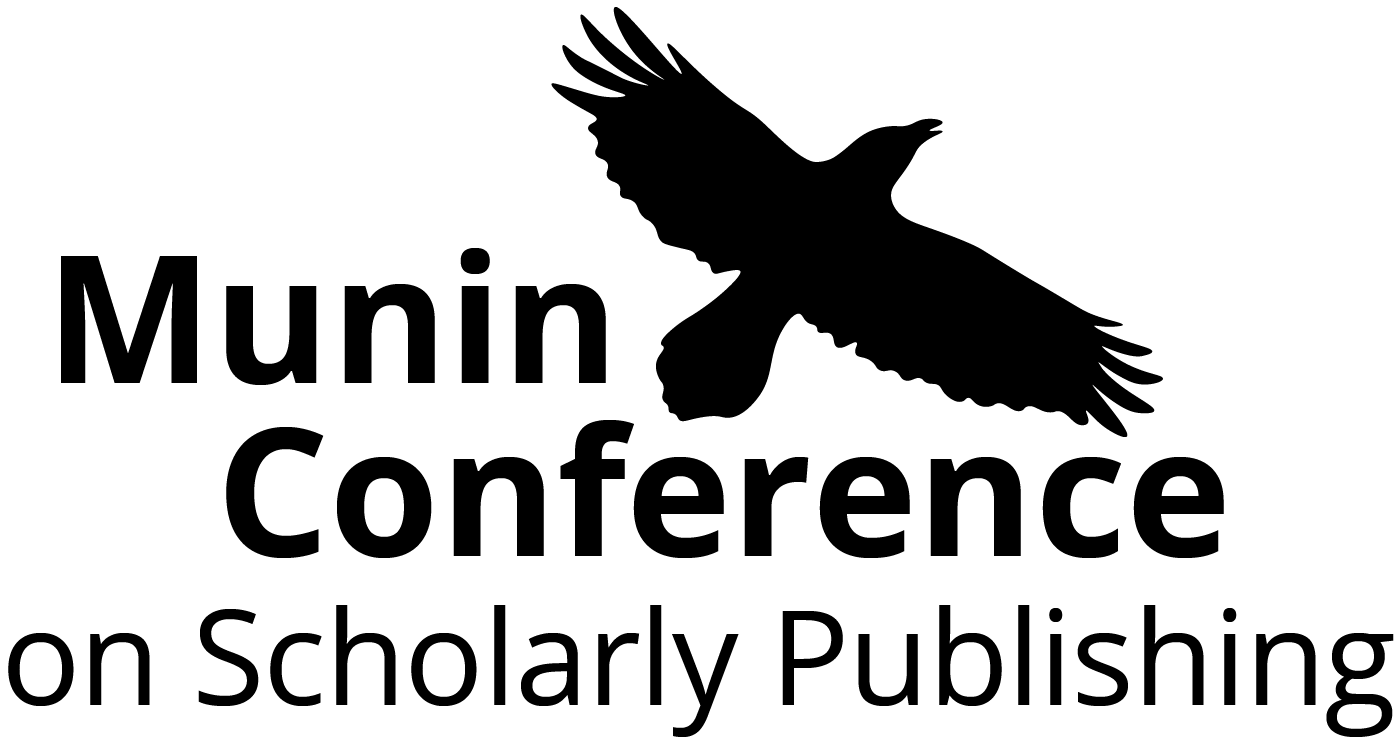This is the programme for the 20th Munin Conference on Scholarly Publishing 2025.
All presentations will take place in Auditoria 1 and 2 (see information about the conference venue). Registration, poster sessions and coffee breaks will take place in the hall outside of the auditoria. The workshop rooms are above the conference hall, accessible by lift or stairs.
After the conference registration deadline (29 October), all registered participants will be asked to register for workshops.
18 November
Streaming link for Aud 1 on 18 Nov, all day. For Aud 2, go to the session in the programme.
9:15–9:50
Morning coffee and registration
The hall outside of Auditorium 1
9:50–10:00
Conference opening
Auditorium 1
- Conference chair Mariann Løkse (UiT The Arctic University of Norway)
- Library Director Johanne Raade (UiT The Arctic University of Norway)
10:00–11:00
Panel “Strategies for publishers to make scholarly metadata openly available“
Panel chair – Bianca Kramer (Barcelona Declaration on Open Research Information)
- Colleen Campbell (OA2020)
- Dominic Mitchell (Directory of Open Access Journals)
- Anne Gentil-Beccot (CERN)
- Mike Nason (Public Knowledge Project)
11:05–11:35
Poster pitches
Overview of posters
11:35–12:25
Lunch, Teorifagskantina
12:25–13:35
Parallel presentation sessions
13:35–14:20
Coffee and posters (outside of Auditoria 1 & 2)
14:20–16:00
Parallel workshops (take the stairs or lift from the conference hall, Teorifagbygget House 1)
workshop A. Room 1.317, 3rd floor
“Bridging Gaps by Unlocking the Community Potential – Empowerment through Infrastructure and Networking“,
Oliver Krüger (Hamburg State and University Library)
workshop B. Room 1.343, 3rd floor.
“Setting up a Diamond Open Access fund: budgets, policies and practicalities“, Anne van den Maagdenberg (Vrije Universiteit Amsterdam), Louise Otting (TU Delft), & Erica Yu (Erasmus University Rotterdam)
workshop C. Room 1.413, 4th floor.
“Collective Action Advancing Open Infrastructure“, Rosalie Lack (SCOSS), Joanna Ball (DOAJ) & Raphaël Tournoy (Episciences)
workshop D. Room 1.241, 2nd floor.
“Current state of open source research data management systems“, Steven Eardley and Richard Jones (Cottage Labs)
workshop E. Room 1.333, 3rd floor.
“Solving the “file drawer problem”: How researchers, institutions, publishers and funders can reduce publication bias“, Agata Morka, Rebecca Kirk (PLOS), Jan-Ole Hesselberg (Foundation Dam)
16:00–16:15
Fruit break (outside of Auditoria 1 & 2)
16:15–17:15
Panel “Beyond Borders, Beyond Control: Building Resilient Open Science Infrastructures“,
Auditorium 1,
Panel chair – Anke Beck (Frontiers)
- Heli Kautonen (University of Turku)
- Dana Kristjansson (Norwegian Institute of Public Health)
- Petra Labriga (ZBMed, Institute for Life Sciences)
17:15
Closing of day 1, Auditorium 1
18:30–21:00
Conference reception,
Northern Norwegian Art Museum
Sjøgata 1
19 November
Streaming for Aud 1 on 19 Nov, all day. For Aud 2 go to the sessions in the programme.
8:45–9:15
Coffee
9:15–10:15
Keynote lecture,
Auditorium 1. Chair – Mariann Løkse (UiT)
“Reproducibility starts with methods: Building a culture of openness and reuse“, Tracey Weissgerber (University of Coimbra)
10:15–10:30
Short break to change rooms
10:30–12:10
Parallel presentation sessions
12:10–13:00
Lunch, outside of Auditoria 1 & 2
13:00–14:40
Parallel workshops (take the stairs or lift from the conference hall, Teorifagbygget House 1)
workshop A. Room 1.333, 3rd floor.
“Solving the “file drawer problem”: How researchers, institutions, publishers and funders can reduce publication bias“, Agata Morka, Rebecca Kirk (PLOS), Jan-Ole Hesselberg (Foundation Dam)
workshop B. Room 1.343, 3rd floor.
“Strengthening the Open Agenda by Connecting Opens“, Paul Stacey, Paola Corti & Vanessa Proudman (SPARC Europe)
workshop C. Room 1.307, 3rd floor.
“Strides towards co-creating the research nexus”, Kora Korzec & Dominika Tkaczyk (Crossref)
workshop D. Room 1.317, 3rd floor.
“From Gatekeeping to Guidance: Building Fair and Reflective Editorial Practices“, Christina Lentz, Linda Hamrin Nesby & Ingri Løkholm Ramberg (UiT The Arctic University of Norway)
workshop E. Room 1.325, 3rd floor.
“Owning the Means of Publication: Zine Making & The Radical Possibilities of Publishing“, Zoe Wake Hyde (Radish Press)
14:40–15:25
Coffee and posters
15:25–16:20
Parallel presentations
| Aud 1. Session “Research & Indigenous rights”. Chair – Mariann Løkse (UiT) | Auditorium 2. Session “News from far away”. Chair – Åsne Høgetveit (UiT). Streaming link | |
| 15:25–15:50 | “Indigenous rights in, over or to research?“, Linda Wiechetek & Trond Trosterud (UiT The Arctic University of Norway) | “The current landscape of the Open Science Initiative in the ASEAN region“, Randolf Mariano (University of Inland Norway & UiT), Reysa Alenzuela (Oriental Institute of the Czech Academy of Sciences) & Joseph Marmol Yap (University of the Philippines Diliman) |
| 15:55–16:20 | “CARE & FAIR: Opposing or Aligning Concerns?“, Else Grete Broderstad (UiT The Arctic University of Norway) | “Opening peer review in Algerian universities: Survey of The Faculty at The Institute of Library Science and Archive – University of Algiers II“, Samir Hachani (University of Algiers II) |
16:20–16:40
Fruit break
16:40–17:40
Panel on indigenous rights in research
Auditorium 1,
Panel chair – Torjer Andreas Olsen (UiT The Arctic University of Norway)
- Sheryl Lightfoot (University of Toronto)
- Susanna Siri (UiT The Arctic University of Norway)
- Else Grete Broderstad (UiT The Arctic University of Norway)
17:40
Closing of day 2, Auditorium 1
18:00
Conference dinner,
restaurant Adelie, on campus
20 November
Streaming link for Aud 1 on 20 Nov, all day. For Aud 2, go to the session in the programme.
8:45–9:15
Coffee
9:15–10:15
Keynote lecture,
Auditorium 1. Chair – Mariann Løkse (UiT)
“Open science in a closing world“, Kenneth Ruud (The Norwegian Defence Research Establishment)
10:15–10:30
Short break
10:30–11:55
Parallel presentations
11:55–12:50
Lunch, Teorifagskantina
12:50–14:20
Presentations,
Auditorium 1. Chair – Mariann Løkse (UiT)
- “Who Edits Reality? The Politics and Pragmatics of Scholarly Infrastructure“, Maciej Maryl (The Polish Academy of Sciences)
- “From academia to the grassroots – open access, knowledge sharing and politics in Pacific Islands agriculture“, Peter Walton (Independent consultant, Peter Walton & Associates)
- “From Publish-and-Read Deals to Diamond Open Access: How Library Budgets Can Support Non-Commercial Publishing“, Per Pippin Aspaas (UiT)
14:20–14:30
Conference closing
